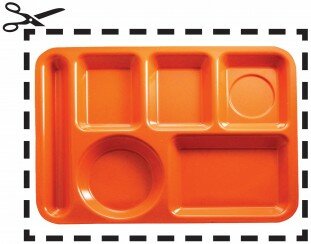Sustainable U: Wahoo dining goes trayless
The sight of a modern day Bluto Blutarski stuffing his cafeteria tray like the immortal Animal House character may be coming to end. In fact, UVA students gathering up their melange of fruits, veggies, and entrees this fall might find themselves performing a juggling act. At semester's start, all three major dining halls will be missing a venerable cafeteria staple: the trays.
UVA Dining Services' decision to go trayless at Observatory Hill, Runk, and Newcomb is part of a growing national trend to save water as schools such as the University of Florida and UNC have already ditched the plastic carriers.
"We've been encouraging it for close to two years now as a voluntary program," says the director of dining, Brent Beringer. "There's a positive interest from the students in doing it."
Already, UVA's become know for water conservation. Despite ten years of growth, including a vastly expanded medical center, the university has slashed its annual water usage by more than a quarter, with 477 million gallons in 2007, down from 660 million gallons in 1998. The trayless move is projected to reduce overall dining hall water consumption by a third.
However, early experiments in ditching trays offered mixed results. An effort called "Trayless Tuesdays," adopted in the spring semester of 2006, met with some student body hesitation.
"It wasn't marketed well," says Sonny Beale, the superintendent of UVA Recycling. "They didn't make students aware of it, caught them off guard in the middle of the year– the students were used to using a tray for everything."
This time, however, dining director Beringer predicts the policy will succeed. "In our most recent survey," he says, "84 percent of students were willing to go trayless."
Trayless dining halls take sustainability to another level. Beyond water savings, there's a reduction in soap and electricity use. And, according to studies done by Aramark Limited, UVA's dining provider and facilities manager, food waste in trayless dining halls can be reduced by up to 30 percent.
"We tend to eat with our eyes and take we what we think we want," Beringer says.
The trayless plan will be voluntary, with trays on hand for those who insist, he says, and trays will also be available for people with disabilities or special needs. (The student-athlete dining hall, inside the John Paul Jones Arena, will not be going trayless for the time being, due to the smaller population it serves and its dinner-only schedule.)
While removing trays will be a major step in bringing sustainability to a new level at UVA, Dining Services plans to go further by enacting a composting plan for all organic waste from both the O-Hill dining room and kitchen as soon as this fall, Beringer says. Any post-consumer waste, from banana peels to chicken bones to napkins, will be ground and sent to a composting site. While it has yet to be approved by administration, the composting plan will be regulated by the Virginia Department of Environmental Quality, he adds.
Ben Chrisinger, chair of a Student Council sustainability committee, recalls with frustration that his group was unable to enact a mandatory tray reduction program last fall, even with Charlottesville under drought restrictions. "We're excited," he says in an email, "to see Dining propose a program as ambitious as this one, and I think current students will be surprised by how much is saved with such a simple change."
With three trayless dining halls and a composting plan on tap, the fall ushers in promises of increased efforts to put sustainability in the hands of the students. If students find the change a bit of an initial challenge, the benefits outweigh the uneaten food tossed on unused trays, according to Beringer.
"First years may find the change pretty easy, because they won't know any other way," Beringer says. "For upperclassmen, it may be a little traumatic."
#
This story was originally published in the August 21 edition of the Hook (a rare example of print publication before web publication).

2 comments
Not allowing a college student to stuff his or her tray is unAmerican!
Why not use a waterless cleaning system like the products used in hand sanitizers instead?